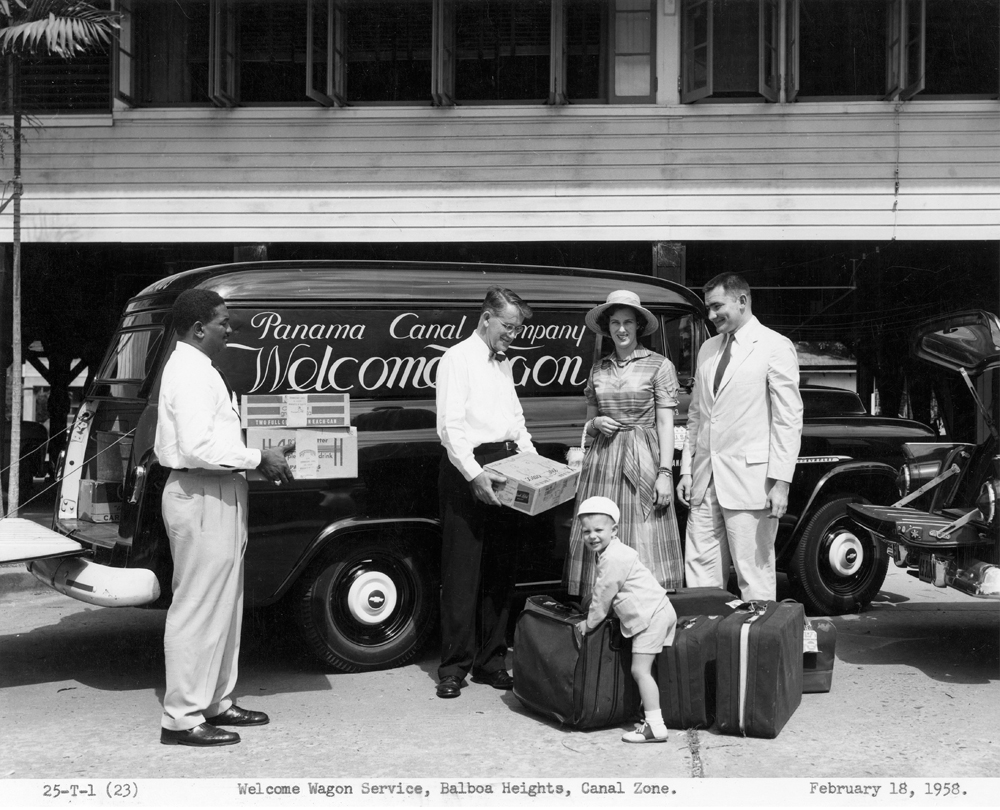|
Photo of the Week
This week we have a unique photo of the Panama Canal Company Welcome Wagon. This photo was taken to be used in the March 7, 1958 issue of the Panama Canal Review. I never knew of this program and was a good way to welcome new employees with open Zonian arms. I wonder if everyone received this treatment. Here is the article that was published to accompany the photo: "A real
WELCOME greets Canal's newcomers Frederick
Willoughby, 2, didn't pay much attention to Maxwell Smith and Fitz
Charles, left, when they explained the Welcome Wagon service to his
parents. There need be no
more frantic first trips to the commissary for new employees from the
United States, thanks to a Welcome Wagon service just inaugurated. A new family will
find enough food in the Welcome Wagon assortment to provide a
palatable lunch and break-fast the next day, too, together with a pair
of sheets, a pair of pillowcases, towels, washcloths, light bulbs,
soap, garbage-can bags, and a few other miscellaneous items for
household use. The new Zonians
will be able to spend their first day getting unpacked and more or
less settled in their new home, rather than having to rush off to
their neighborhood commissary. The idea of a
Welcome Wagon has been flourishing in the United States for almost 25
years but has never been tried here before. A few units have
"settling-in kits" for their newcomersó things like sheets
and towels and pots and pansóbut these are on a loan basis, to be
packed up and set aside for the next to arrive. Some years ago,
newcomers were hurried to the commissary by their escorts as soon as
they arrived to pick up pre-packaged bedding and linen for which they
paid themselves. Today's Welcome Wagon assortmentófrom bacon and
eggs and coffee to ice, if neededóis charged against the division
for which the new employee will work. In
the United States the items which make up a welcome assortment are
contributed by merchants in the newcomer's community. In the Canal Zone,
the Welcome Wagon is a cooperative project of the Community Services
Division, the Personnel Bureau, and the employing division, with the
Housing Branch of the Community Services Division making arrangements
for the assortment and providing the actual delivery service. When Maxwell Smith
of the Personnel Bureau notifies the housing office that a new family
is arriving, the housing office in turn calls the nearest commissary
to assemble a standard welcome assortment. The commissary has
everything packed and ready and a few minutes after the new family has
reached their quarters, the Welcome Wagon is at their door. Its driver and
semi-official welcomer, who carries the welcome assortment into the
newcomer's house and helps Mr. Smith answer some of the many questions
the newcomers invariably ask, is Fitz Charles, a man with an
infectious smile who has been driving for the housing office for
several years. While the
recipients of the Welcome Wagon's first call were officially "new
employees," the only real newcomer in the family was two-year-old
Frederick Willoughby. He was much more interested in the whereabouts
of his box of animal crackers than in the fact that he and his
parents, Mr. and Mrs. William Charles Willoughby, were making local
history. Mr. Willoughby, a
graduate intern-engineer for the Locks Division, is the third
generation of his family to work for the Canal organization. His
grand-father, W. C. Willoughby, came to the Canal Zone just before the
Canal was opened in 1914 and his father, Fred, of Gatun, is a foreman
mechanic at Gatun Locks. Mrs. Willoughby, the former Ann Edwards, is
the daughter of Mrs. Russell A. Edwards of the Payroll Branch. Both
are graduates of Canal Zone high schools, Mr. Willoughby from
Cristobal High School in 1948, and his wife from Balboa High School
three years later."
|

